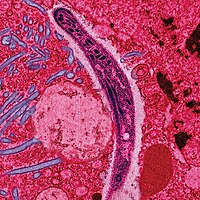
Photo from wikipedia
Evolutionary theories of disease avoidance propose that humans have a set of universal psychological processes to detect environmental cues indicative of infectious disease. These processes then initiate cognitive, emotional, and… Click to show full abstract
Evolutionary theories of disease avoidance propose that humans have a set of universal psychological processes to detect environmental cues indicative of infectious disease. These processes then initiate cognitive, emotional, and behavioral responses that function to limit contact with harmful pathogens. Here, we study the conditions under which people exhibit behavioral avoidance of others with a contagious illness or a physical injury (i.e., a broken leg), and the potential mechanisms that underlie this behavior. Across three studies, participants were given the option of sitting at one of two workstations previously occupied by two confederates, one of whom either showed visible symptoms of a cold (contagion condition), wore a lower-leg orthopedic boot and used crutches (broken leg condition), or showed no signs of illness or physical injury (control). We found strong evidence that adults explicitly avoid contact with individuals who show symptoms of a contagious illness. Further, we provide some evidence that adults also avoid individuals with a physical injury, but that this behavior might be driven by implicit, unconscious processes. The findings are discussed in terms of implications for the healthy avoidance of contagion, and the risk for potential stigmatization of non-contagious groups.
Journal Title: PLoS ONE
Year Published: 2022
Link to full text (if available)
Share on Social Media: Sign Up to like & get
recommendations!